Friday, March 31, 2006
Sidebar Award
I don't think an award exists yet for the longest blog sidebar in the world. But if it did, I'm pretty sure milkriverblog would take it hands down. If, after reading it, you don't know everything there is to know about Tony G and his world, you're not trying hard enough. The only thing missing seems to be his checkbook register.
Exception to the Rule
I once heard a representative of the Center for Disease Control say: "The question is not 'Why are so many people sick?' The question is, 'Why isn't everyone sick?'" If everyone's exposed to roughly the same environmental influences, why are some people not affected. I think this applies to social norms as well as physiological diseases.
Nova's program about Sophie Germain describes her pursuit of math in the 18th century when women were discouraged or prevented from intellectual pursuit of any kind. The story of how her father confiscated her candles to prevent her from studying doesn't surprise me. Nor does the fact that she assumed a man's identity in order to study at the Ecole Polytechnique in Paris. What does surprise me is that when her mentor discovered her real identity, he was pleased and continued to teach her.
When Germaine reached a partial solution to Fermat's theorem, she contacted famous mathematician, Carl Fredrich Gauss, again using the male identity she had used to start at Ecole Polytechnique. When her real identity was revealed Gauss wrote to her:
It should be noted that the two most intellectual and well educated men in her life were the ones to accept her and her work.
Nova's program about Sophie Germain describes her pursuit of math in the 18th century when women were discouraged or prevented from intellectual pursuit of any kind. The story of how her father confiscated her candles to prevent her from studying doesn't surprise me. Nor does the fact that she assumed a man's identity in order to study at the Ecole Polytechnique in Paris. What does surprise me is that when her mentor discovered her real identity, he was pleased and continued to teach her.
When Germaine reached a partial solution to Fermat's theorem, she contacted famous mathematician, Carl Fredrich Gauss, again using the male identity she had used to start at Ecole Polytechnique. When her real identity was revealed Gauss wrote to her:
But how to describe to you my admiration and astonishment at seeing my esteemed correspondent Monsieur Le Blanc metamorphose himself into this illustrious personage who gives such a brilliant example of what I would find it difficult to believe. A taste for the abstract sciences in general and above all the mysteries of numbers is excessively rare: one is not astonished at it: the enchanting charms of this sublime science reveal only to those who have the courage to go deeply into it. But when a person of the sex which, according to our customs and prejudices, must encounter infinitely more difficulties than men to familiarize herself with these thorny researches, succeeds nevertheless in surmounting these obstacles and penetrating the most obscure parts of them, then without doubt she must have the noblest courage, quite extraordinary talents and superior genius.
It should be noted that the two most intellectual and well educated men in her life were the ones to accept her and her work.
Tuesday, March 28, 2006
Blueberries
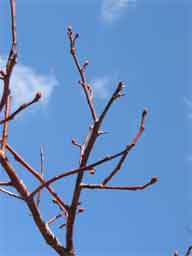
Lovely weather lured me outside yesterday to prune the blueberries - the first task on my garden "to do" list.
Blueberry bushes are supposed to look something like this. See the nice round little buds at the end of each twig?
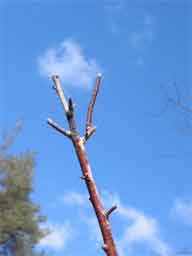 But most of mine look like this: See? No little round buds on the ends of the twigs? The thing about blueberry bushes is this: Deer love to eat the tips. I guess I have to get serious about protecting them in the winter when the electric fence is down. We've talked, on and off, for years about caging them in net to keep out birds. I used to figure there were enough berries to share. But not any more. Deep sigh. I hate digging post holes.
But most of mine look like this: See? No little round buds on the ends of the twigs? The thing about blueberry bushes is this: Deer love to eat the tips. I guess I have to get serious about protecting them in the winter when the electric fence is down. We've talked, on and off, for years about caging them in net to keep out birds. I used to figure there were enough berries to share. But not any more. Deep sigh. I hate digging post holes. 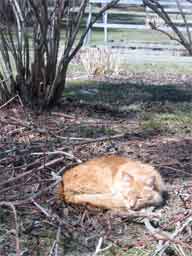
Here's Tang, helping me with the pruning chores. It can't be comfortable sleeping on those blueberry branches.

So he moves to where he knows the catnip grew last summer and will grow again this year.

On the bright side... Look at these Winter Aconites (Eranthis hyemalis) I don't know why they're not more commonly grown. They usually start to bloom before the snow is gone. And if it doesn't warm up too fast, they go on for weeks. When the temperature is over 50 they're full of honey bees. Which reminds me... I have to go find an online source for beekeeping supplies. After years of neglect, we're resurrecting our beehives.
Monday, March 27, 2006
Impending Doom?
The Miriam Webster word of the day is:
I don't like to take this an an omen, but I've been reading more about the Iranian bourse. (I wonder if bourse is going to be a 2006 top ten word.) This from Global Research, Canada:
And this from Arab News:
This reads somewhat like this Oct 30, 2000 CNN article:
The Daily Kos post, incidentally, links to an Ithaca Times article on the top ten most censored news stories:
Götterdämmerung
\gher-ter-DEM-uh-roong\ noun
: a collapse (as of a society or regime) marked by catastrophic violence and disorder; broadly : downfall
I don't like to take this an an omen, but I've been reading more about the Iranian bourse. (I wonder if bourse is going to be a 2006 top ten word.) This from Global Research, Canada:
Beginning in March 2006, the Tehran government has plans to begin competing with New York's NYMEX and London's IPE with respect to international oil trades – using a euro-based international oil-trading mechanism.[7] The proposed Iranian oil bourse signifies that without some sort of US intervention, the euro is going to establish a firm foothold in the international oil trade.
And this from Arab News:
On March 20 Iran opens a new “bourse” (exchange) on which countries all over the world can buy and sell oil and gas not only for dollars but also for euros. It also establishes a new oil “marker” (oil pricing standard) based on Iranian crude and denominated in euros, in open rivalry to the existing West Texas Intermediate, Norway Brent and UAE Dubai markers, all of which are calculated in US dollars.
This reads somewhat like this Oct 30, 2000 CNN article:
UNITED NATIONS (Reuters) -- A U.N. panel on Monday approved Iraq's plan to receive oil-export payments in Europe's single currency after Baghdad decided to move the start date back a week.SOJ wrote about this in a December 2005 Daily Kos post about the Federal Reserve's announcement that it intends to stop reporting on dollars held by foreign institutions on March 23, 2006. (If you only click on one link in this post - make it this one).
The Daily Kos post, incidentally, links to an Ithaca Times article on the top ten most censored news stories:
One bit of news that hasn't received the public vetting it merits is Iran's declared intent to open an international oil exchange market, or "bourse." Not only would the new entity compete against the New York Mercantile Exchange and London's International Petroleum Exchange (both owned by American corporations), but it would also ignite international oil trading in euros. "A shift away from U.S. dollars to euros in the oil market would cause the demand for petrodollars to drop, perhaps causing the value of the dollar to plummet," Brian Miller and Celeste Vogler of Project Censored wrote in Censored 2006.So, is the reason we're not hearing about this in the mainstream media that it's not important? Or that it is important?
Sunday, March 26, 2006
War for Oil?
It's good to start the day with an "Aha!" kind of moment. Eleutheros, at How Many Miles from Babylon, describes the shift from the gold standard to the oil standard. I'm thinking "Why didn't I think of that?" and "Why am I not hearing this explanation from anyone else?" This is all stuff I know something about, but I've never put it together.
Skip over the history directly to the part where, for some reason, the world agrees, in the 80s, that all oil transactions will be made in US dollars and this stabilizes the dollar to a degree unknown since we stopped backing it with gold. Then cut to the day when Iraq announces that it intends to start selling oil in Euros. This is, naturally, terribly threatening to the US and we intend to prevent it. Meanwhile European countries, who would love to be able to buy oil in Euros, are understandably reluctant to support the US. As someone who's been searching for a real explanation for the war, this makes sense to me.
Then add this, from Eleutheros:
This helps me understand we used to support Hussein and now we don't. And why suddenly we're worried about weapons capability in Iran. It's not weapons capability we're worried about. It's dollars and oil.
Skip over the history directly to the part where, for some reason, the world agrees, in the 80s, that all oil transactions will be made in US dollars and this stabilizes the dollar to a degree unknown since we stopped backing it with gold. Then cut to the day when Iraq announces that it intends to start selling oil in Euros. This is, naturally, terribly threatening to the US and we intend to prevent it. Meanwhile European countries, who would love to be able to buy oil in Euros, are understandably reluctant to support the US. As someone who's been searching for a real explanation for the war, this makes sense to me.
Then add this, from Eleutheros:
At the end of this month two important things happen:
1) Iran has declared that it is setting up a Euro based oil market.
2) The US Federal Reserve will no longer publish the M3 report revealing how many dollars are held by foreign interests.
If the US does not stop Iran from opening a world oil market outside the US monetary system, the countries around the world that are now holding US dollars as their only means of procuring oil will dump those dollars back on the market making the dollar devalue abruptly. You know what follows.
This helps me understand we used to support Hussein and now we don't. And why suddenly we're worried about weapons capability in Iran. It's not weapons capability we're worried about. It's dollars and oil.
Saturday, March 25, 2006
Daughters of the Earth
Bartleby.com posts this quote on the front page of the American Heritage Dictionary:
"I am not so lost in lexicography as to forget that words are the daughters of earth, and that things are the sons of heaven."Isn't that lovely? What does it mean?
—Preface to Dictionary (1755)
Samuel Johnson
Friday, March 24, 2006
Top Ten Words
Miriam Webster has posted the top ten words - the words looked up most often in 2005.
1. integrity
2. refugee
3. contempt
4. filibuster
5. insipid
6. tsunami
7. pandemic
8. conclave
9. levee
10. inept
It's understandable that words in the news like tsunami, pandemic, levee and filibuster would be looked up a lot. But integrity? Has that been in the news much lately? And contempt. What's up with that? And why last year were a lot of people wondering just what insipid means?
Check out the words for 2003 and 2004. I'm sure some will surprise you.
Wouldn't it be cool if the dictionary kept track of the words you look up for you? Then at the end of the month you could quiz yourself.
1. integrity
2. refugee
3. contempt
4. filibuster
5. insipid
6. tsunami
7. pandemic
8. conclave
9. levee
10. inept
It's understandable that words in the news like tsunami, pandemic, levee and filibuster would be looked up a lot. But integrity? Has that been in the news much lately? And contempt. What's up with that? And why last year were a lot of people wondering just what insipid means?
Check out the words for 2003 and 2004. I'm sure some will surprise you.
Wouldn't it be cool if the dictionary kept track of the words you look up for you? Then at the end of the month you could quiz yourself.
Homeland Security
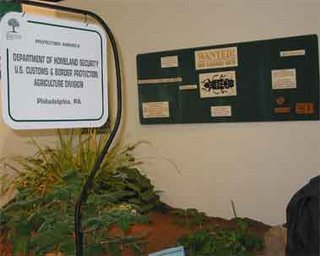 I took this picture of Homeland Security's exhibit at the Philadelphia Flower show last year. Do you find yourself wondering why Homeland Security had an exhibit at the Philadelphia Flower Show? So did I. That's the Asian Longhorn Beetle terrorist in the poster.
I took this picture of Homeland Security's exhibit at the Philadelphia Flower show last year. Do you find yourself wondering why Homeland Security had an exhibit at the Philadelphia Flower Show? So did I. That's the Asian Longhorn Beetle terrorist in the poster.What is it about the term "Homeland Security" that's just too cute? I don't know. It just makes me want to ask "What does that mean?"
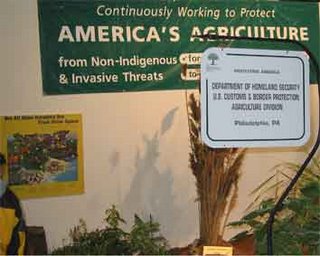 But here we see how broad an umbrella the agency has become. They're working -- no! continuously working, to protect American Agriculture from non-indigenous and invasive species -- at the same time they're protecting us (probably continuously) from hijackers and bombs.
But here we see how broad an umbrella the agency has become. They're working -- no! continuously working, to protect American Agriculture from non-indigenous and invasive species -- at the same time they're protecting us (probably continuously) from hijackers and bombs.
Thursday, March 23, 2006
Vietnam and the Presidency
On C-Span tonight at 8:00 PM Vietnam and the Presidency: The Media and the Role of Public Opinion
Friday at 8:00 PM Vietnam and the Presidency: Lessons Learned
C-SPAN doesn't make it easy to find the schedule, but I imagine this series will be shown through the middle of the night, too. If you can get a chance to watch the segment titled, "Vietnam and the Presidency: Presidential Tapes," don't miss it.
Friday at 8:00 PM Vietnam and the Presidency: Lessons Learned
C-SPAN doesn't make it easy to find the schedule, but I imagine this series will be shown through the middle of the night, too. If you can get a chance to watch the segment titled, "Vietnam and the Presidency: Presidential Tapes," don't miss it.
Instilling Fear
Yesterday Attorney General Gonzales had the pleasure of announcing the the indictment of 50 members of Colombian 'narcoterrorist' group FARC. Not as stunning, perhaps, as the January indictment of eleven American 'ecoterrorists.' Still, it's a dangerous trend for the Department of Justice to label everyone they don't like as a "terrorist" since apparently the DOJ needn't follow any laws in its treatment of terrorists.
"We will not tolerate any group that terrorizes the American people," Attorney General Alberto Gonzales said at a Jan. 20 Washington, D.C., press conference.
I'm very literal so it seems like a terrorist should be a very, very scary thing. But Webster's New World and American Heritage dictionaries say terrorism is the "use of threats or force to intimidate." Maybe I'm less easily threatened or intimidated than others but that doesn't sound so scary. Let's call that "threatism." Miriam Webster, my new best friend, defines terrorism as "the systematic use of terror especially as a means of coercion" and terror as "intense fear."
Okay. That sounds scary. And here's my point. It's the current White House administration using terror to intimidate. The Earth Liberation Front and the Columbian drug lords really don't inspire intense fear in me. Okay. They shouldn't be setting fires or making millions from the sale of addicting drugs. But if I'm not raping the environment or selling illegal drugs, I just don't find them that threatening.
I do find the systematic attack on the Constitution scary. I do find the Fundamentalist Christian intent to subordinate women scary. I find the right wing subversion of language and lack of critical thinking skills that makes that effort so successful scary.
Long ago I read a science fiction story in which Americans woke one morning to find the government had been taken over by totalitarians. And the book went on to detail how unthinking citizens had allowed this to happen. I wish I could remember the name of that book.
"We will not tolerate any group that terrorizes the American people," Attorney General Alberto Gonzales said at a Jan. 20 Washington, D.C., press conference.
I'm very literal so it seems like a terrorist should be a very, very scary thing. But Webster's New World and American Heritage dictionaries say terrorism is the "use of threats or force to intimidate." Maybe I'm less easily threatened or intimidated than others but that doesn't sound so scary. Let's call that "threatism." Miriam Webster, my new best friend, defines terrorism as "the systematic use of terror especially as a means of coercion" and terror as "intense fear."
Okay. That sounds scary. And here's my point. It's the current White House administration using terror to intimidate. The Earth Liberation Front and the Columbian drug lords really don't inspire intense fear in me. Okay. They shouldn't be setting fires or making millions from the sale of addicting drugs. But if I'm not raping the environment or selling illegal drugs, I just don't find them that threatening.
I do find the systematic attack on the Constitution scary. I do find the Fundamentalist Christian intent to subordinate women scary. I find the right wing subversion of language and lack of critical thinking skills that makes that effort so successful scary.
Long ago I read a science fiction story in which Americans woke one morning to find the government had been taken over by totalitarians. And the book went on to detail how unthinking citizens had allowed this to happen. I wish I could remember the name of that book.
Wednesday, March 22, 2006
Time
I'm looking forward to trying this Library Thing. In the meantime, since Blogger still won't upload photos, I'm going to have lunch with a local volunteer fire department chief. It's business.
Monday, March 20, 2006
Word Cloud
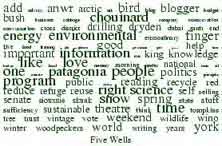 Laura's right. This is so much fun. WordCloud. If you're wondering what's on your own mind, this is like a brain screenshot. It naturally changes over time. I wouldn't have guessed that Chouinard figured so large in my thoughts. But I have referred, several times in conversation, to his thinking of environmental issues as fundamental to solution of all world issues. I venture to guess that next week it will be something else altogether. And some fun juxtapositions come up: Patagonia people, right science, sustainable theatre.
Laura's right. This is so much fun. WordCloud. If you're wondering what's on your own mind, this is like a brain screenshot. It naturally changes over time. I wouldn't have guessed that Chouinard figured so large in my thoughts. But I have referred, several times in conversation, to his thinking of environmental issues as fundamental to solution of all world issues. I venture to guess that next week it will be something else altogether. And some fun juxtapositions come up: Patagonia people, right science, sustainable theatre.
Sunday, March 19, 2006
Retirement?
Ronni's Retirement Blues post and its comments at Time Goes By provides good insight to some issues I identify with. Most of us look forward to having more control over how we spend our time. And many of us are doing better things with that time than when we were committed to paying jobs. But there's something wrong with the words retire and retirement that somehow implies going to sleep.
In my youth, I was a nudist. (I was bolder, and thinner, then.) But in the sixties, taking pleasure in being naked in social situations was taboo enough that nudists were inclined to protect their anonymity. I found it interesting to learn to make small talk without asking "Where are you from?" or "What do you do?" --the two quickest and least meaningful ways to start a conversation.
Then there was an unemployed interlude between grad school and marriage when I found myself stumped by the question "What do you do?" I was happily busy helping care for Bill's family and property. I was learning tons about botany, ornithology, self-sufficiency and life. But there was just no easy answer to "What do you do?"
Now, having been pushed out of the nest of my last job, and my unemployment benefits having long since expired, I'm retired. I didn't plan it that way. I'm too young for it. But there it is. Once again, there's no easy answer to "What do you do?" And, like Ronni and others, I'm vaguely embarassed by that fact. I'm a blogger, a writer, a designer, a decorator, an advisor, a gardener, a reader - not necessarily in that order. If I were paid for any of those activities, they'd be perfectly respectable. I was all those things (except blogger) when I was still working for the theater. Yet, when asked, I said I was Business Director of the theater. I was proud of the job and it occupied, by far, most of my time. Was it the most important part of my life? No. But it paid, and people could understand that.
Why is developing my own garden, part time for free, less important that developing someone else's garden for pay? Maybe it's not just the absence of pay that makes retirement hard to describe. Maybe it's the involvement in several, more or less equal, occupations. When I was involved with Leadership Tompkins, we met with a woman whose career was volunteer service. Her husband was CEO of the community bank, so I imagine she didn't need a salary. Her volunteer work was incredibly valuable. She wasn't stuffing envelopes, mind you (tho' that's fine, too.) She was on the Board of Directors of several not-for-profits contributing her "wealth, wisdom and work" to the growth and success of those organizations. I wonder if the "What do you do?" question plagued her.
In my youth, I was a nudist. (I was bolder, and thinner, then.) But in the sixties, taking pleasure in being naked in social situations was taboo enough that nudists were inclined to protect their anonymity. I found it interesting to learn to make small talk without asking "Where are you from?" or "What do you do?" --the two quickest and least meaningful ways to start a conversation.
Then there was an unemployed interlude between grad school and marriage when I found myself stumped by the question "What do you do?" I was happily busy helping care for Bill's family and property. I was learning tons about botany, ornithology, self-sufficiency and life. But there was just no easy answer to "What do you do?"
Now, having been pushed out of the nest of my last job, and my unemployment benefits having long since expired, I'm retired. I didn't plan it that way. I'm too young for it. But there it is. Once again, there's no easy answer to "What do you do?" And, like Ronni and others, I'm vaguely embarassed by that fact. I'm a blogger, a writer, a designer, a decorator, an advisor, a gardener, a reader - not necessarily in that order. If I were paid for any of those activities, they'd be perfectly respectable. I was all those things (except blogger) when I was still working for the theater. Yet, when asked, I said I was Business Director of the theater. I was proud of the job and it occupied, by far, most of my time. Was it the most important part of my life? No. But it paid, and people could understand that.
Why is developing my own garden, part time for free, less important that developing someone else's garden for pay? Maybe it's not just the absence of pay that makes retirement hard to describe. Maybe it's the involvement in several, more or less equal, occupations. When I was involved with Leadership Tompkins, we met with a woman whose career was volunteer service. Her husband was CEO of the community bank, so I imagine she didn't need a salary. Her volunteer work was incredibly valuable. She wasn't stuffing envelopes, mind you (tho' that's fine, too.) She was on the Board of Directors of several not-for-profits contributing her "wealth, wisdom and work" to the growth and success of those organizations. I wonder if the "What do you do?" question plagued her.
Saturday, March 18, 2006
Defend ANWR Again!
I'm so discouraged. This from the League of Conservation Voters yesterday:
The House and Senate take turns approving and defeating measures to allow oil drilling in the Arctic National Wildlife Refuge. As recently as December 2005 the House approved drilling and the Senate defeated it. Now roles are reversed.
This much remains true: Environmentalists have to win every battle; developers only have to win once.
New York Senators Schumer and Clinton and Representative Boehlert, from my district, are staunch defenders of ANWR. But if you're from another district or state, or you know someone from another district or state (does that cover all of us?), visit the League of Conservation Voters Scorecard (or find the LCV icon on my sidebar and enter a zip code), find a legislator who needs to be educated and do your best.
For information about drilling in ANWR see the Almanac of Policy Issues. For the savvy reader who wants to see what the opposition's saying, look at ANWR.org where the recent Senate vote is reported as a "Victory." The site is owned by Arctic Power, "a grassroots, non-profit citizen's organization with 10,000 members founded in April of 1992 to expedite congressional and presidential approval of oil exploration and production within the Coastal Plain of the Arctic National Wildlife Refuge."
(Cross posted at Dryden Democrats)
Washington -- The Senate narrowly passed a budget resolution Thursday that would open the Arctic National Wildlife Refuge to oil drilling, setting up another showdown in Congress this year over the most fought-over piece of land in America.
Republican leaders approved the measure 51-49 after securing the vote of Sen. Mary Landrieu, a Louisiana Democrat, by offering up to $10 billion in projected revenues from drilling in the Alaskan refuge and in offshore waters to rebuild the hurricane-battered Gulf Coast.
The House and Senate take turns approving and defeating measures to allow oil drilling in the Arctic National Wildlife Refuge. As recently as December 2005 the House approved drilling and the Senate defeated it. Now roles are reversed.
This much remains true: Environmentalists have to win every battle; developers only have to win once.
New York Senators Schumer and Clinton and Representative Boehlert, from my district, are staunch defenders of ANWR. But if you're from another district or state, or you know someone from another district or state (does that cover all of us?), visit the League of Conservation Voters Scorecard (or find the LCV icon on my sidebar and enter a zip code), find a legislator who needs to be educated and do your best.
For information about drilling in ANWR see the Almanac of Policy Issues. For the savvy reader who wants to see what the opposition's saying, look at ANWR.org where the recent Senate vote is reported as a "Victory." The site is owned by Arctic Power, "a grassroots, non-profit citizen's organization with 10,000 members founded in April of 1992 to expedite congressional and presidential approval of oil exploration and production within the Coastal Plain of the Arctic National Wildlife Refuge."
(Cross posted at Dryden Democrats)
Thursday, March 16, 2006
I and the Bird #19
Thanks to Coturnix at Science and Politics for listing my Woodpecker post in the new I and the Bird Carnival. Take a look at the dozens of links to birders at the carnival.
Sunday, March 12, 2006
Sustainable Living
When you've been doing something for along time it becomes a habit and you take it for granted. We embarked on self-sufficiency farming in the seventies when all good hippies were doing it. After a while you tend to assume that it's not news anymore. So, it's a joy to read blogs of young people discovering the joys of self-sufficiency and older people continuing their commitment to it.
The shift of emphasis from self-sufficiency to sustainable living is interesting and important. My earliest understanding of economic principles grew from analogies comparing our household to the world. We were taking a great deal of pride in producing as much as possible of our own food, shelter, energy, clothing, music, art, etc. And producing enough excess to trade for things we couldn't grow or make ourselves. Or selling our time and skills (and sometimes our souls) on the open market for cash to cover taxes and such. We learned a lot about the real cost of stuff in raw materials and labor. And something about the cost of government services. We learned to do without stuff that was just too hard to produce. And it turned out that there was a lot of stuff we found we didn't really need.
These were important lessons in sustainable living. Every object in our lives is made by taking some resource from the earth and adding some amount of energy and skill, then consuming, passing on or discarding the object. In any event you've irrevocably changed some natural resource into something else.
I'm putting "Reduce, Reuse, Recycle" in the sidebar and linking it to a post with ideas for doing just that.
The shift of emphasis from self-sufficiency to sustainable living is interesting and important. My earliest understanding of economic principles grew from analogies comparing our household to the world. We were taking a great deal of pride in producing as much as possible of our own food, shelter, energy, clothing, music, art, etc. And producing enough excess to trade for things we couldn't grow or make ourselves. Or selling our time and skills (and sometimes our souls) on the open market for cash to cover taxes and such. We learned a lot about the real cost of stuff in raw materials and labor. And something about the cost of government services. We learned to do without stuff that was just too hard to produce. And it turned out that there was a lot of stuff we found we didn't really need.
These were important lessons in sustainable living. Every object in our lives is made by taking some resource from the earth and adding some amount of energy and skill, then consuming, passing on or discarding the object. In any event you've irrevocably changed some natural resource into something else.
I'm putting "Reduce, Reuse, Recycle" in the sidebar and linking it to a post with ideas for doing just that.
Saturday, March 11, 2006
Spring?
 Today was a truly springlike day. Robins darting around on the lawn, honeybees in the Winter Aconites. Warm and sunny. Every year I try to remain cautious about spring expectations. I can't help remembering 1983 when we had twelve inches of snow on April 19th. We had picked armloads of daffodils the day before the snow.
Today was a truly springlike day. Robins darting around on the lawn, honeybees in the Winter Aconites. Warm and sunny. Every year I try to remain cautious about spring expectations. I can't help remembering 1983 when we had twelve inches of snow on April 19th. We had picked armloads of daffodils the day before the snow.
Friday, March 10, 2006
King and I
On paper and in my head I'm working on several post topics this week. But most of my head and heart (and time and energy) is devoted to King this week. Granted it's been a while since he ran circles around me when we go for a walk, but I didn't realize thirteen is old for dogs 'til I took King to the vet for a rabies shot last month and she categorized him as  geriatric. I'll try not to attribute cause and effect to my change in attitude and his health. But his health is failing. The news from the vet is that we're apparently looking at end-of-life care. The good news is that, with pain medication, he's getting around okay and eating specially prepared meals. The bad news is that pain medication is obviously not a cure.
geriatric. I'll try not to attribute cause and effect to my change in attitude and his health. But his health is failing. The news from the vet is that we're apparently looking at end-of-life care. The good news is that, with pain medication, he's getting around okay and eating specially prepared meals. The bad news is that pain medication is obviously not a cure.
 geriatric. I'll try not to attribute cause and effect to my change in attitude and his health. But his health is failing. The news from the vet is that we're apparently looking at end-of-life care. The good news is that, with pain medication, he's getting around okay and eating specially prepared meals. The bad news is that pain medication is obviously not a cure.
geriatric. I'll try not to attribute cause and effect to my change in attitude and his health. But his health is failing. The news from the vet is that we're apparently looking at end-of-life care. The good news is that, with pain medication, he's getting around okay and eating specially prepared meals. The bad news is that pain medication is obviously not a cure.
Monday, March 06, 2006
Woodpeckers
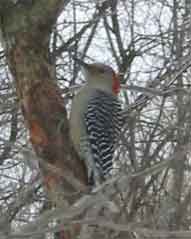 On the phone last week, my sister was talking through identifying a bird at her feeder. We concluded it was a red-bellied woodpecker. I remember when I first identified them in my yard I couldn't help thinking it was a ridiculous name.
On the phone last week, my sister was talking through identifying a bird at her feeder. We concluded it was a red-bellied woodpecker. I remember when I first identified them in my yard I couldn't help thinking it was a ridiculous name.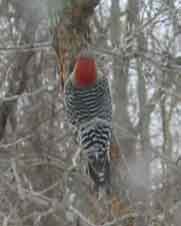 I mean, do you see any red on the belly? On the other hand, I think all male woodpeckers have some red on their heads, so the search for distinguishing characteristics picks up on some pretty subtle things.
I mean, do you see any red on the belly? On the other hand, I think all male woodpeckers have some red on their heads, so the search for distinguishing characteristics picks up on some pretty subtle things.Yesterday, coming back from tapping maple trees I looked up in unconscious response to the high pitched voices overhead to find a flock of cedar wax-wings in our huge black cherry tree. I guess they're here all winter, but I don't see them very often and I can't help being delighted. A friend told me last night that she'd recently seen an albino cedar waxwing. It's like a test: can you name this bird without color clues? Candace says it takes a minute, but luckily waxwings have a distinctive silhouette.
Lots of birds that have been hanging around in twos and threes are now showing up in big groups. I don't usually have tree sparrows at the feeder but this morning, in addition to the usual gang of mourning doves, chickadees, juncos and titmice, there's a big group of tree sparrows.
Saturday, March 04, 2006
Country Folk
Friday, March 03, 2006
Snow Day

Yesterday was perhaps the last significant snowfall of the season. Well, I think it was also the first. It's been a mild winter.
It's easy to make fun of gazing globes. But I'm spearheading a defense. This one stands fairly discreetly in the woodland. In the summer it's surrounded by foliage. And, honestly, there's something magical about gazing at the colorful, magnified mirror image of the garden.
Thursday, March 02, 2006
Patagonia
A week or two ago on UCTV, Yvon Chouinard spoke about his book and his life and the development of his company Patagonia. If you can possibly watch it on the UCTV site you'll find it well worth your time.
First, it's amusing. As a child Chouinard felt very different from other kids. With good reason, I guess. At the age of twelve, he became interested in falconry. Men from a falconry club taught him to rappel down cliffs to capture falcons. (Let's set aside the ethics of that for a moment.) The experience led Chouinard to his interest in climbing and by the time he was eighteen he was hand-forging reusable pitons and selling them for $1.50 each. A great tale follows of his hippie youth and how climbing led to the search for suitable clothes and to making and marketing them.
Second, it's reassuring, even inspiring, to read how Chouinard's ethics and environmental awareness guided the growth of the company. The Patagonia website includes a section of environmental essays which "examines Patagonia's struggle to reduce the environmental harm we do as a business, as well as actions we can all take as individuals to lighten the tread of the human ecological footprint.." Patagonia's involvement with 1% for the Planet, The Conservation Alliance and Patagonia Land Trust illustrate the company's commitment to addressing environmental issues. Their pursuit of organic cotton and least toxic dyes has led to important advances in the field. And their donation of $18 million to environmental organizations is nothing to sneeze at.
Chouinard has been asked why they don't contribute to social causes. His response is that examining social issues, he finds that ultimately they spring from environmental problems. I haven't examined this position closely, but intuitively I think there's a case to me made for it. Chouinard's example is that with one in six women expected to face breast cancer, and given the incredible increase over just one generation, one would hypothesize environment causes. Yet of all the money, public and private, dedicated to breast cancer research, only 3% goes toward finding causes.
When I'm discouraged with the state of personal ethics in the world, which is most of the time, I find stories like Chouinard's comforting.
First, it's amusing. As a child Chouinard felt very different from other kids. With good reason, I guess. At the age of twelve, he became interested in falconry. Men from a falconry club taught him to rappel down cliffs to capture falcons. (Let's set aside the ethics of that for a moment.) The experience led Chouinard to his interest in climbing and by the time he was eighteen he was hand-forging reusable pitons and selling them for $1.50 each. A great tale follows of his hippie youth and how climbing led to the search for suitable clothes and to making and marketing them.
Second, it's reassuring, even inspiring, to read how Chouinard's ethics and environmental awareness guided the growth of the company. The Patagonia website includes a section of environmental essays which "examines Patagonia's struggle to reduce the environmental harm we do as a business, as well as actions we can all take as individuals to lighten the tread of the human ecological footprint.." Patagonia's involvement with 1% for the Planet, The Conservation Alliance and Patagonia Land Trust illustrate the company's commitment to addressing environmental issues. Their pursuit of organic cotton and least toxic dyes has led to important advances in the field. And their donation of $18 million to environmental organizations is nothing to sneeze at.
Chouinard has been asked why they don't contribute to social causes. His response is that examining social issues, he finds that ultimately they spring from environmental problems. I haven't examined this position closely, but intuitively I think there's a case to me made for it. Chouinard's example is that with one in six women expected to face breast cancer, and given the incredible increase over just one generation, one would hypothesize environment causes. Yet of all the money, public and private, dedicated to breast cancer research, only 3% goes toward finding causes.
When I'm discouraged with the state of personal ethics in the world, which is most of the time, I find stories like Chouinard's comforting.
Wednesday, March 01, 2006
Skunk Cabbage
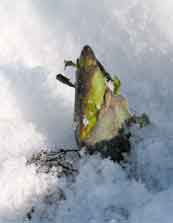
Last Friday Ontario Wanderer posted a photo of skunk cabbage - his first spring wildflower. Well, if he's got one, I want one. He's in, you know, Ontario. I'm in New York. I feel entitled. So, Bill and I set out toward where they grow. It may be a fifteen minute walk if you're just trying to get there. But we dawdled.
When we got to where I know they grow, we saw just snow. Poking around a bit turns up some buds. I wouldn't call them flowers yet. But you've got to give them credit for trying.
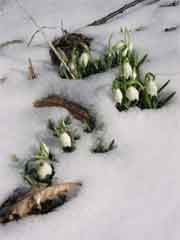
On the homefront, brave little snowdrops are poking up through the snow.
Reduce, Reuse, Recycle
I will update this post as I collect more information and ideas about how to:
Reduce
Reuse
Recycle
Reduce
- Carbon Footprint: Be aware of the size of your impact on the earth.
Reuse
Recycle
Subscribe to:
Posts (Atom)

